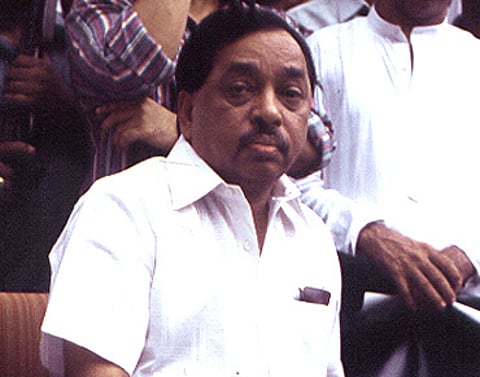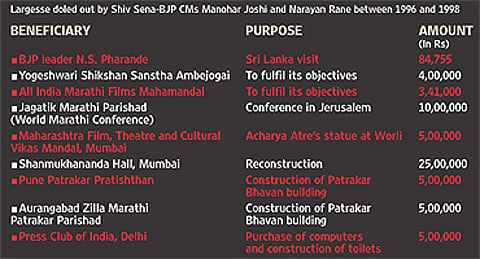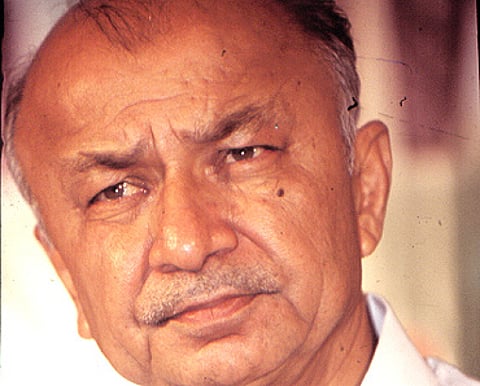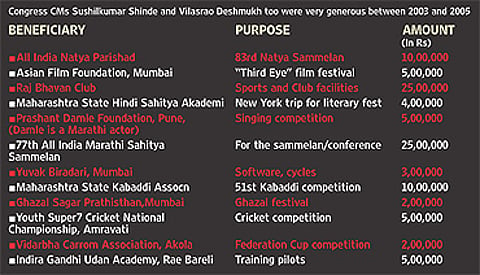In Stark Relief
Check the 'victims' who got money from the CM. It's a calamity.

Accordingly, the CMRF chest was opened up for the reconstruction of the Shanmukhananda Hall auditorium which was gutted in a fire in 1990. It was sanctioned Rs 25 lakh in 1997 despite an official noting that the "funds in the CMRF are low". The well-appointed Raj Bhavan in Mumbai, where the Maharashtra governor and visiting heads of state stay, also got Rs 25 lakh in 2003 to refurbish its sports and club facilities. The Press Club in Delhi got Rs 5 lakh in 1998, most of which was used to construct toilets, undertake electrical work, purchase computer hardware and software. The swimming club in Thane got Rs 60,000.

In 2003, the Centre for Advanced Strategic Studies in Pune was given Rs 2 lakh on the recommendation of former Union home secretary Madhav Godbole. This was the second time it was given the money, having got Rs 5 lakh in 1993. No heed was obviously paid to the official file noting attached to Godbole's letter which read (translated from Marathi): "As per the rules of the CMRF, the financial assistance cannot be given—however, according to the honourable chief minister's instructions and directive, the proposal is put up for sanction." Such notings or remarks appear routinely on files. They show that CMO officials have pointed out violations but have had to bow to political pressures. When Godbole made his recommendation, Sushilkumar Shinde was the CM.

CMRF's beneficence has also gone to kabaddi and chess competitions, towards construction of buildings for hundreds of educational institutions, to youth organisations for purchase of cycles and computers. It has contributed regularly to the kitty of Marathi cultural, theatre and literary festivals; and money has also gone to a ghazal festival, a Congress MLA's religious programme and to actors' fan clubs. The press clubs in Mumbai, Pune and other cities across the state have regularly applied for and got amounts between Rs 2 lakh and Rs 5 lakh. The most ridiculous of the CMRF's dole would have to be those that went to a mango festival and to the Indira Gandhi Udan Academy.
"This is nothing but a brazen exercise in arbitrariness," says Shailesh Gandhi, well-known rti activist, who first filed an application to the CMRF in 2005. "My chief minister is not a king or feudal lord to dip into his treasure chest and give away money to who he pleases. The CMRF is a public authority to which the common man has donated in good faith." After a tortuous legal process involving two appeals, during which the CMO desisted from parting with information under an arsenal of legal and other excuses—like the CMRF is not a public body, giving information may attract breach of privilege in the state legislature and so on—the state information commission earlier this year ruled that CMRF was indeed a public authority and its disbursements had to be transparent. CM Vilasrao Deshmukh finally opened it for public scrutiny on February 28 this year.

On its part, the CMO says that only about 26-30 per cent of the CMRF has gone to individuals/institutions not affected by natural calamities or accidents. The bulk has been given to "worthy victims"—of the Kargil war, the Orissa cyclone and so on. That, however, does not impress public-spirited individuals like former cop Y.P. Singh who exposed corruption in the police or social activist Gerson da Cunha. "The fund was given for renovation of clubs and temples at a time when 9,000 children in Maharashtra died of malnutrition," says Singh. He wonders how people and institutions with good credentials and access to other sources of funds were not ashamed to apply, and worse, were actually found deserving of the CMRF!

Then there's another catch. Most contributions to the CMRF are voluntary but, as the state information commission pointed out, the government has used "its strength, authority and might to mop up maximum contributions". For example, the commissioner for sugar had directed that, following a government order, cooperative sugar factories deduct Rs 2 per tonne crushed for 2005-06 and 2006-07 from its members and deposit it into the CMRF, failing which crushing licences for 2007-08 won't be issued. A day's pay was deducted from the January 2005 salary of all government employees for the CMRF sans their consent.
The average amount in the CMRF is around Rs 200 crore any year. Auditors' reports show that barely 25 per cent of the amount collected is disbursed in a year. For example, while nearly Rs 25 crore was added to the fund in 2006-07, only Rs 6.7 crore was disbursed. "The amounts are too small for politicians to be interested in them, but the fact is that successive CMs have treated the fund as their personal purse and have in turn earned goodwill or perhaps silence from critics," remarks Singh.
As it happens, the CMRF is also registered as a public charitable trust with the charity commissioner. However, records still show the late V.P. Naik, the CM of Maharashtra in 1967, as president of the trust. "That this public trust has had no meetings, has kept no minutes of meetings and has no clear rules/guidelines for disbursement should send alarm signals to the public, many of whom contribute massively to it," says Gandhi.
Now that the misuse of its funds has become public knowledge, the trust will perhaps pull its act together. Only then will public money not be gifted away to undeserving private interests.
Tags